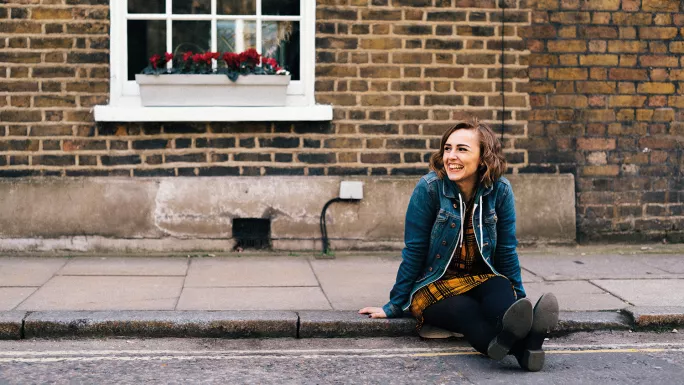- Home
- Tes talks to...Hannah Witton
Tes talks to...Hannah Witton

I don’t feel that non-heterosexual sex should be classified as ‘This is gay sex’ or ‘This is lesbian sex’,” says YouTube’s leading UK-based sex and relationships vlogger, Hannah Witton. “We all have the same body parts. So we should just be talking about different types of sex that different people can do. For example, you could say: ‘This is sex that involves a penis and a vagina; this is sex that involves two vaginas and some fingers and some toys; this is sex that involves a penis and a bum; this is sex that involves two penises.’”
This, if Witton has any say in the matter, is the kind of content we should be including in the new sex and relationships education (SRE) curriculum (currently under construction and scheduled to land in schools in September 2019). And she has more advice where that came from. Witton tweeted education secretary Justine Greening in March to offer her services in advising on the new curriculum. She feels that she deserves a call back.
“I would love to help create the new curriculum because it’s my main passion and I’m in a valuable position because of my insight into the young people in my audience,” she says. “Together, we can come up with something that really helps young people.”
Her claim for a voice at the table is a strong one: she has 332,000 subscribers to her YouTube channel and her videos have notched up more than 28 million views to date. Her work in the field has led her to be named Best Sex and Relationships Influencer 2016 by Cosmopolitan; she is an ambassador for the sexual health charity Brook; and she has made films for the NHS. Witton has also written a book - Doing It! - which came out last month.
In January, she took part in a Tes feature about the influence of YouTube on how young people want to access sex ed, but now that the government has confirmed that SRE will become compulsory, she wants to share her vision of how it might work in schools.
Train up teachers
The first thing she’d do is take the pressure off teachers: she doesn’t think SRE should necessarily be down to them - not, at least, without proper training.
“I really believe that it shouldn’t be on teachers to give these classes because, for whatever reasons, they might not be comfortable doing it, they might not have all the answers,” she explains.
“It really should be done by specialists or the teachers should be given training for it, but that’s going to cost money.”
With cash not exactly plentiful in education, teachers are likely to be thrown into SRE teaching, whether they have been trained or not; if that proves to be the case, Witton is a model of how it could work.
She has not been trained, as such. Instead, she speaks from experience. Unsatisfied with the SRE provided in the school that she attended, Witton has been reclaiming sex ed by delivering it directly through her YouTube channel. In her upbeat, searingly frank vlogs, she covers topics including masturbation, having sex while on your period and “slut shaming”; she then invites her followers to share their own experiences and ask questions about sex.

It’s not necessarily the content of her vlogs but her approach that could be of use to teachers: great SRE is about facilitation rather than explicitly teaching, she suggests.
“What I don’t want to do is be the authority on it and be the final voice,” she says. “I want to give my viewers a tool and the knowledge to be able to think critically and explore things for themselves. I think it’s the peer-to-peer education that is really valuable. A lot of my viewers are around the same age as me, so we’re all going through similar things at the same time. I don’t claim to have all the answers, I’m just someone who will research things, but also ask lots of questions - often questions that other people will have, too - and that is just as valuable, I think.”
A role providing a platform for informed discussion rather than explicitly teaching about sex may be appealing to teachers. But if they took this approach, Witton says they would need to ensure that they were “sex positive”.
“By sex positive, I mean being inclusive and recognising the positive aspects of sex and relationships,” says Witton, who adds that her own education was severely lacking in this respect. “For example, the way we were taught about sexually transmitted infections (STIs): we were shown loads of images of genitalia that had untreated STIs - really extreme cases. We were just shown all of these images and told to use a condom, rather than talking about STIs, how they are treated, how they’re passed on. The education I had made me genuinely believe that people who had STIs were disgusting - and that is sex-negative education.
“We also need to talk about things like pleasure and be LGBT+ inclusive, and not make sex seem like this shameful and embarrassing thing.”
Depicting gay sex
When it comes to providing a school environment that is LGBT+ inclusive, Witton believes that we are far behind the times. She says that the new curriculum - and those teaching it - must present sex and relationships in a manner that is not purely seen through a prism of heterosexuality.
“One of the main things that is extremely lacking is the lack of LGBTQ+ education,” she says. “A lot of it has to do with the language that you use and also the examples that teachers give. I remember in school workbooks, it was always a heterosexual couple in the pictures. It’s really simple to change things like that, occasionally just having a gay couple or whatever.”
She thinks this is something that can be addressed early on by referencing non-heterosexual relationships in primary school. Her advice to teachers trying to create a more inclusive SRE education is to watch their language and keep things gender neutral wherever possible.
“Something I really try to do in my YouTube videos is to use non-gendered language when talking about bodies,” she says. “If I’m talking about periods, I try to avoid talking about women and I say ‘people with vaginas’ instead because some trans men might have vaginas and some women might have penises. That’s probably a bit advanced for younger kids, but it’s definitely important that the language we use doesn’t make assumptions about people’s gender and sexual orientation. I think teachers can lead by example on things like that.”
Where she will specify content that needs to be covered is on the topics of porn and sexting. She says that these are big issues for young people and schools need to tackle them directly.
“We need to be discussing porn in schools,” she states. “When you don’t have sex education in school, most of the sex ed that young people are getting is from porn. That’s their education, so I don’t think we should be shaming young people for watching porn; porn’s not going anywhere, but there definitely needs to be a counternarrative offered, so that when young people do watch porn, then they can be more critical about it and see it as entertainment rather than what sex actually should be like.
“Ask the kids, ‘Is this like real sex? What is the difference?’ We need to talk about the way that a lot of porn treats women, and discuss body image and performance anxiety and expectations and all of those things.”
Witton advises teachers that, when talking to students about sexting, it is important to tell them what the law says on the matter.
Perhaps controversially, she believes that primary teachers should be laying the groundwork for a lot of these topics and welcomes Greening’s announcement that SRE is to become statutory in all schools, including at primary level.
She also thinks that pupils need to be taught about topics such as puberty at a younger age.
“We have to remember that the age that kids are starting puberty is getting younger and younger,” she says. “Girls as young as 8 are getting their periods, so you can’t not talk about periods to five-year-olds, because that might happen to them really soon, or happen to their friends really soon, and I think we need to be less scared about talking to kids about these things.
“It’s not a case of sexualising them at all. I remember being a kid and being repulsed by most of this stuff. Kids self-censor. If a child is old enough to ask, then they’re old enough to have an honest answer and I do think that puberty education should come before kids start going through puberty, rather than while it’s happening.”
Hearing young people’s views
Asking students for their views is the number one recommendation Witton has for those forming the new curriculum.
“Obviously, get the advice of charities and all those organisations already working in the SRE sector, but also talk to young people,” she urges. “I would advise Justine Greening to listen to young people about how they want their sex ed to be given, what they thought was missing when they were in school and what is missing now.”
As for her own role in all of this, she has not received a reply to her approach to the education secretary. “But as an ambassador for Brook, I will be involved with the charity and hopefully have access to shaping education policy that way”, she says.
Whatever form the new curriculum takes, Witton acknowledges that when teaching about sex, you can’t please everyone.
“There is no such thing as the perfect SRE curriculum,” she admits, “but there will always be a better one. We should always be striving for that.”
Lucy Edkins is a freelance journalist. Hannah Witton is a sex and relationships YouTuber; she tweets at @hannahwitton and her website is hannahwitton.com. Witton’s debut book, Doing It, is out now (Wren and Rook, £7.99)
Keep reading for just £1 per month
You've reached your limit of free articles this month. Subscribe for £1 per month for three months and get:
- Unlimited access to all Tes magazine content
- Exclusive subscriber-only stories
- Award-winning email newsletters


